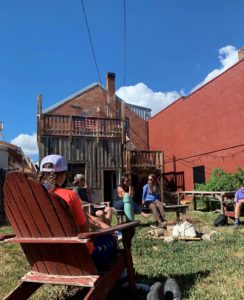
The Cream of the West warehouse smelled like fresh breakfast cereal. In the sparsely furnished warehouse there were big metal bins and conveyer belts—the roaster, the cooler and the packaging machine. Alicia Moe, the general manager of Cream of the West, explained that the machines that make this business possible were brought to Harlowton in 2002 by different community families using horse trailers and grain trucks. It’s this kind of community effort that brought her here and keeps her passionate about her efforts to sustain small businesses in this former railroad town.
Harlowton, Montana, population 1,170. Eleven of us arrived on bike from Ryegate. We took our seats in a circle, on the floor and on folding chairs, talking with Alicia. After riding 25 miles through a gusty headwind in the 90-degree heat, we were relieved to get into some shade and give our legs a rest. As we settled inside the office, it began to rain.
On Day 8 of WRFI’s 2021 Cycle the Rockies course, the group met with Alicia Moe to talk about her experiences in Harlowton owning Cream of the West.
Alicia is driven by an impulse to support Harlowton through Cream of the West in myriad little ways. The company’s gift boxes include locally roasted coffee, honey sweetened by area flowers and bees and a logo designed by a local college student.
Bringing small business to small towns helps prepare the community for change — economic change, climate change — by diversifying the economy and bringing new people to town.
Alicia talked about the struggles of being a business owner. Managing and marketing a small cereal firm is harder than she thought it would be. And in small towns it can be hard to hire the help you need. You need to wear many hats in a small town, she said. This would become a common theme as we met other entrepreneurs and business managers.
Later on our trip we would meet Sarah Calhoun, owner of Red Ants Pants in White Sulfur Springs and founder of the nonprofit of the same name. Sarah had similar experiences starting a business in a small town as a woman. When she was new to town, Sarah set about earning a place in the community. She coached sports at the school, served on boards and avoided divisive political talk. Talk about wearing many hats!
Sarah talked about how hard it is proving to be sustainable as a clothing business. Many industries, including textiles, depend on infrastructure that supports high chemical usage and multiple rounds of transportation to process the fabrics. However, Red Ants Pants tries to source fabric solely from the United States. Sarah’s goals are to support the economy and limit the emissions that come from transporting textiles in every step of the process.
When components of their products are more locally sourced and don’t involve a conglomeration of parts from every place in the world, transportation emissions are sharply reduced. As transportation is one of the main contributors to carbon dioxide emissions in the world, the less worldwide shipping in production and distribution, the better.
Earlier in the course, we had visited Signal Peak Coal mine. All of their coal is exported to Asia and coal as an industry has been in sharp decline in part due to global pressure to reduce emissions. The company will close when it has mined all the coal it has leased, or when it becomes uneconomical to keep selling what it mines. Either way, its workers are already worried about what they will do for work when the mine is done.
Communities with a diversity of businesses are better able to weather changes like a mine shutting down. Keeping jobs and money in small towns keeps communities strong and services local and enough neighbors around to help with the heavy lifting.
Rachel French is a junior at University of Wisconsin Madison studying Kinesiology.